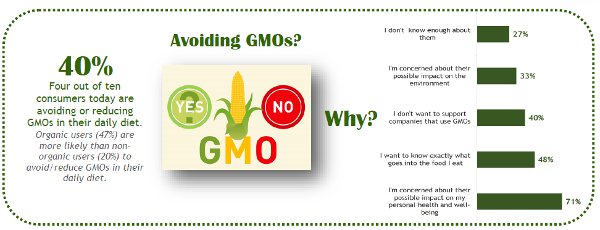GMOs: The Elephant That Won’t Leave The Room
 Consumer anxiety continues to swirl around the issue of genetically modified organisms, most commonly referred to as GMOs. The recent news that the USDA has developed a voluntary government certification and labeling program for foods that are free of GMOs has done little to deflate consumers’ fears and ratchet down anxiety levels.
Consumer anxiety continues to swirl around the issue of genetically modified organisms, most commonly referred to as GMOs. The recent news that the USDA has developed a voluntary government certification and labeling program for foods that are free of GMOs has done little to deflate consumers’ fears and ratchet down anxiety levels.
GMOs have become a potent symbol of the problems plaguing America’s food system. Regardless of how informed and accurate consumers’ understandings of GMOs are, general sentiment touches on the nerves of deepening mistrust of food companies and government institutions. What continues to fuel anxiety around GMOs?
For many consumers, GMOs is a buzzword and a nebulous concept but an issue that raises a host of concerns:
- Alarm about food that is unnatural and manipulated in a laboratory for questionable purposes
- Anxiety that the consequences for human health and the environment are, at best, unknown, if not demonstrably negative
- Suspicion that there is a lot of money to be made from GMOs
- Cynicism that companies are putting profit over consumers’ health
- Indignation over producers of GMOs treating small farmers poorly and using coercive and unfair business tactics
There is not yet a comprehensive and consistent consumer understanding of GMOs:
- Slightly more than half of consumers (52 percent) say they understand what GMOs are
- Less than a third of consumers (30 percent) say they know which crops are most likely to use GMOs
- Even fewer consumers (28 percent) say they know which products have GMO ingredients
- Only 9 percent of consumers understand that certified organic foods are GMO-free
And recurring headlines anchor the issue as an important factor in people’s lives:
- Vermont’s GMO labeling legislation that passed in 2014
- The Non-GMO Project driven by retailers and manufacturers with an organic mandate
- Whole Foods Market aiming to be a fully transparent retailer, requiring GMO-free labeling by 2018
- Chipotle announcing a goal to serve GMO-free foods
- The overall cultural movement toward real, fresh and less processed foods and beverages
 Source: Organic & Natural 2014 report, The Hartman Group
Source: Organic & Natural 2014 report, The Hartman Group
Interest around the topic of GMOs continues to grow as does concern about the lack of transparent communication.
The Hartman Group’s Sustainability: Transparency 2015 report finds that 64 percent of consumers say that “knowing what ingredients are in a food or beverage” is of top importance to them, and among these consumers 41 percent say they want to know about GMOs.
Food and beverage companies that stay quiet on the issue risk losing their place in the conversation, not to mention facing the greatest risk of losing consumer trust and relevance. Food retailers, restaurants and the media are leading the way in developing a compelling narrative around the GMO issue. The increasing availability of GMO-free and labeled products further erodes consumer trust in companies that remain silent.
Lack of communication only feeds suspicions. Food retailers and other food companies can step in and help consumers make better-informed decisions. It does not necessarily mean taking a stand on labeling or pesticides or any other aspect of the GMO debate but simply meeting customers where they are and using information to allay their confusion and maintain their trust.
Reports:
